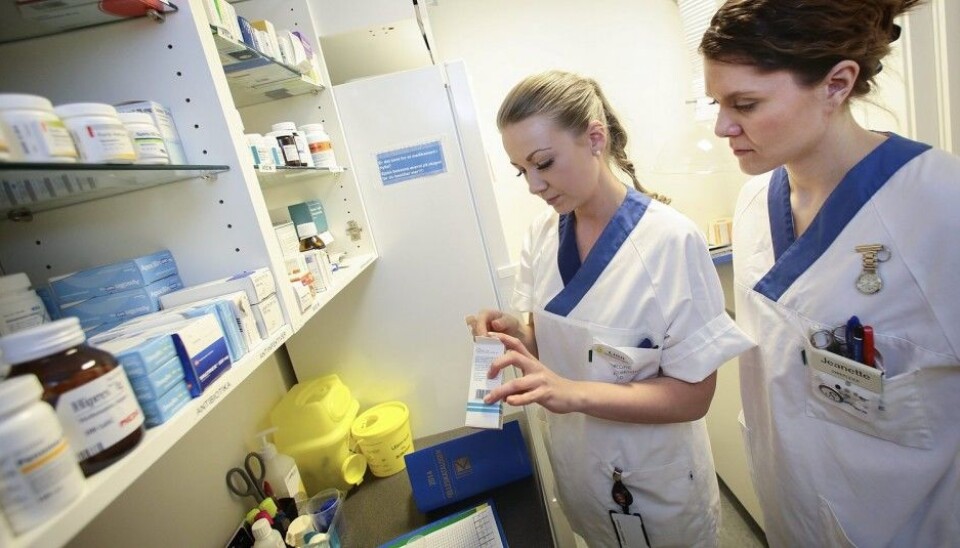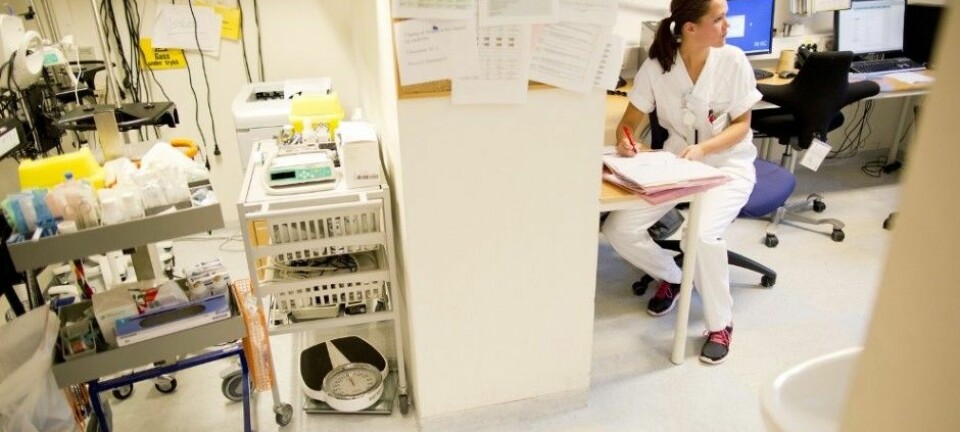
Nurses need more know-how in drug management
Some registered nurses (RNs) know too little about one of their daily tasks: administering drugs to patients. A researcher thinks the risk of medication error in Norway is too high.
One of the most important tasks a nurse is supposed to master is providing patients with the right doses of the correct medications. Sometimes they foul up.
Death is a worst-case result if a nurse does not give the proper dose of a drug at the right time to the right patients.
Medications were involved in one out of five reported cases of errors made in the Norwegian health services in 2014, according to the Knowledge Centre for the Health Services.
Might some of the cause be a lack of knowledge amongst health personnel?
In a small study, researchers tested the knowledge of some 200 registered nurses, most of them women.
Insufficient knowledge was found in several areas.
Sure about incorrect answers
The nurses were given questions ranging from storage and preparation and distribution of medications to knowledge about the drugs’ effects and side-effects. They were also asked to give proper dosages of drugs — a task encompassing medication administration, pharmacology and drug dosage calculations.
Moreover, they were required to indicate how confident they were of each of their answers.
The composite answers gave an indication about the risks of making mistakes on the job. The researcher evaluated the risk high if the RNs were very certain they had the correct answers when they really had wrong ones.
The results showed that the nurses had a high risk of making a mistake in one out of four handlings of medications.
“It was surprising to see that knowledge of administration of medications was not higher, as these were tasks that nurses carry out daily,” says Bjørg Simonsen on the web pages of Inland Hospital Trust, where she heads a department.
However, the participants answered that they administer medications less than once a week.
The study was made ten years ago as part of the doctoral thesis which Simonsen recently completed.
RNs just a little better than students
Out of a possible score of 14 points, the average among the registered nurses was 7.5 in the handling of medications.
Their knowledge of pharmacology and calculating doses also left something to be desired, with respective average scores of 10.3 and 11.2 out of 14 possible.
Student nurses are known for having trouble in doing the math and calculating correct doses of drugs. Half of the students at Oslo and Akershus University College flunked their exams in medication calculations in 2014, writes the Norwegian newspaper Aftenposten. This is a hard test to pass involving stringent demands.
But experienced RNs might not do much better. Simonsen found only minor differences in her comparison of nurses and student nurses.
With 12 years of experience on the job on average, the RNs were only slightly better on her tests, getting an average of 69 percent correct answers as against the students’ 62 percent.
The number of participants in the study was relatively low, so it might not be representative of Norway’s nurses nationwide. The participants had to volunteer themselves to participate in the study and Simonsen estimates that nurses with even poorer knowledge would be less inclined to accept the challenge.
On the other hand, things could have improved during the ten years since the tests were carried out.
Little help in short courses
Yet a more recent Norwegian study also showed that health personnel are lacking in competence. Neither the nurses nor the unskilled staff in elderly care in nine investigated municipalities knew enough about when a disease had taken a turn for the worse and how to respond appropriately.
“These are serious deficiencies. Worst case, it can mean that patients are not getting the treatment they need,” said the associate professor in nursing science, Pia Cecilia Bing-Jonson to ScienceNordic’s Norwegian partner, forskning.no, last year.
According to Bjørg Simonsen, RNs obtain their general level of knowledge about medications in their first year on the job. They need refresher courses later on to keep astride of developments.
A two-day course in calculation of doses was not enough to improve their knowledge, except for those who knew the least.
Simonsen thinks more thorough education is called for. She refers to a study from Australia in which an eight-week course followed by a two-week placement in hospitals made student nurses better at calculating medication dosages.
Reference:
Bjørg Ø. Simonsen: Safe medication management. Evaluation and development of medication competence in registered nurses. Doctoral dissertation at the Norwegian University of Science and Technology, November 2016
-------------------------------------
Read the Norwegian version of this article at forskning.no
Translated by: Glenn Ostling
































